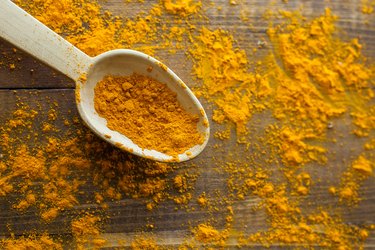
Turmeric powder is a dried spice made from the turmeric plant (Curcuma longa). It is used in cooking and as a dietary supplement.
Its primary active ingredient, bright yellow curcumin, has been studied for help in treating inflammation, arthritis, stomach, skin conditions, gallbladder and liver problems as well as cancer and other systemic maladies.
Video of the Day
Video of the Day
About Turmeric Powder
The flowering turmeric plant is native to India and Southern Asia, and belongs to the ginger family. The roots are harvested and used fresh in cooking, or boiled in water and dried. They are then are ground into the deep orange-yellow powder so prevalent in curried dishes.
Known for its fragrant aroma and slightly bitter taste, turmeric is a familiar and well-used culinary spice in Indian cuisine. It is also the major source of the polyphenol curcumin, believed to have anti-inflammatory and antioxidant properties.
Turmeric powder, which contains curcumin, is used worldwide in both cooking and natural coloring. Culinary use is a way to take advantage of its health benefits. Turmeric is a staple ingredient in Indian curries and is served in tea in Japan. In the United States, turmeric powder is found in mustard, cheese and other foods — even lattes.
Health Benefits of Turmeric Powder
Powdered turmeric uses in traditional and Aruveydic medicine are well established, and the modern medical field is now investigating its healing qualities, focusing on curcumin specifically. The Memorial Sloan Kettering Cancer Center notes that in the lab, experiments have shown that substances in turmeric, called curcuminoids, prevent inflammation by inhibiting the molecules that cause it.
Despite the current lack of copious evidence to support specific health claims, turmeric powder is still used to ward off cancer, treat infections, reduce inflammation, treat kidney stones and relieve stomach and intestinal gas.
Turmeric may be ingested via food (as a powder), in a liquid extract or in capsules. The Cleveland Clinic cautions that while the risk of side effects from turmeric powder is low, and drug interactions are unlikely you should stop taking turmeric if you have any ill effects. Turmeric powder may cause bloating or interact with blood-clotting medications, according to Cleveland Clinic.
Read more: Turmeric vs. Milk Thistle
Turmeric Uses in Cancer Treatment
Curcumin is being studied for use in treating many types of cancer, because it is believed to contain antioxidant properties. It may also decrease swelling and inflammation which appears to play a role in cancer.
A study published in August 2018 in the Proceedings of the National Academy of Sciences showed that curcumin effectively kills certain cancer cells. Although the study was conducted on mice rather than humans, its findings are worth mentioning because it suggests that curcumin could potentially be used for prevention or treatment for proteasome-addicted cancers, such as triple-negative breast cancer and multiple myeloma.
Still, the Mayo Clinic is careful to mention that research is ongoing in regard to turmeric, citing the possibility that curcumin may be able to prevent cancer, slow the spread of cancer, make chemotherapy more effective, and protect healthy cells from damage by radiation therapy, even if it has not been scientifically proven.
How to Take Turmeric Powder
The National Institutes of Health claims that turmeric powder used in amounts tested for health purposes is generally considered safe when taken by mouth or applied to the skin. However, turmeric powder taken in large doses or used long-term could cause gastrointestinal problems.
Anya Guy, a Mayo Clinic dietitian commenting in a September 2018 article for the Mayo Clinic News Network, recommends taking turmeric powder in its powder form or in food such as curries or chutneys. The suggested turmeric dosage is up to 8 grams a day. It's best to start at a low dose and work up to a higher one. This will help prevent any potential gastrointestinal problems until you are accustomed to turmeric's effects on your system.
If you have a chronic health condition, consult your doctor before taking turmeric supplements.
- National Institutes of Health, National Center for Complementary and Integrative Health: "Turmeric"
- U.S. National Library of Medicine National Institutes of Health: "Curcumin: A Review of Its’ Effects on Human Health"
- Memorial Sloan Kettering Cancer Center: "Turmeric"
- The Mayo Clinic: "Curcumin: Can it Slow Cancer Growth?
- The Mayo Clinic: "Mayo Clinic Minute: Are There Health Benefits to Taking Turmeric?"
- PNAS: "Ancient Drug Curcumin Impedes 26S Proteasome Activity by Direct Inhibition of Dual-Specificity Tyrosine-Regulated Kinase 2"
- NIH: National Cancer Institute: "Chronic Inflammation"
- The Cleveland Clinic: "7 Tips for Taking Turmeric"
- Herbal Medicine: Biomolecular and Clinical Aspects. 2nd edition: "Turmeric the Golden Spice"
- Susan G. Komen Foundation: "Turmeric"